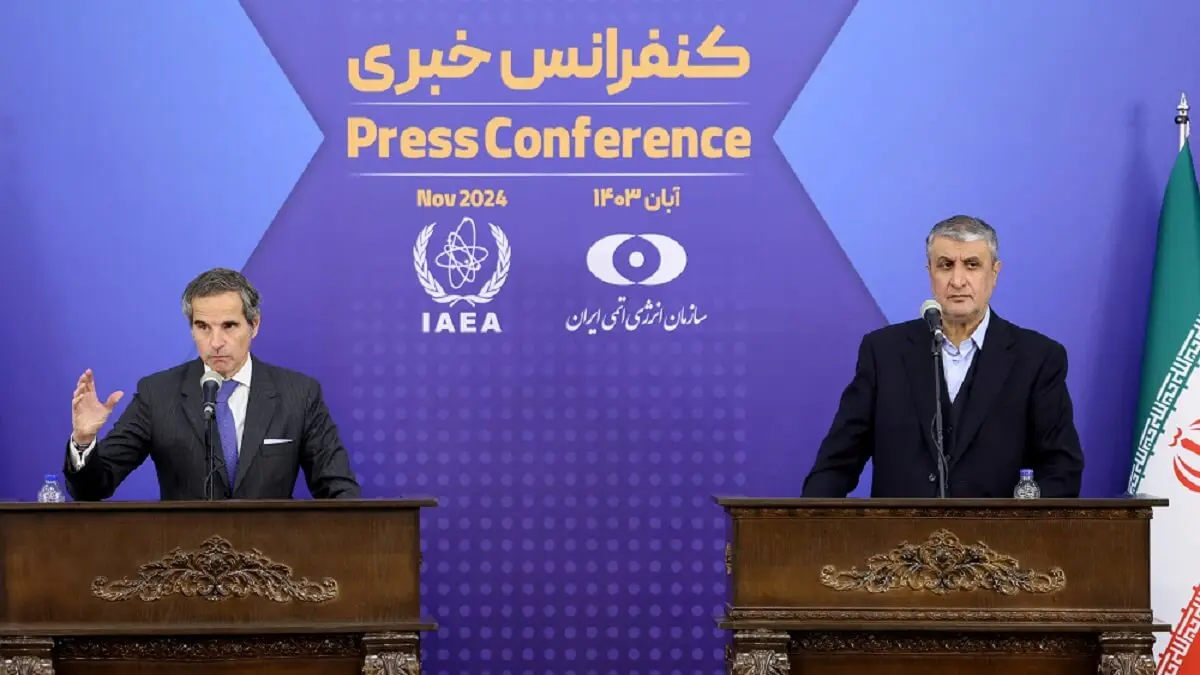Iran warns it will not negotiate on its nuclear programme under pressure

Iran's chief diplomat Abbas Araqchi warned Thursday that his country will not negotiate ‘under pressure or intimidation’ over its nuclear programme, after meeting with the Director General of the International Atomic Energy Agency (IAEA), Rafael Grossi.
For his part, the head of the Iranian Atomic Energy Organisation, Mohammad Eslami, assured that the Islamic Republic would react ‘immediately’ to any foreign pressure, and Grossi urged to obtain results in the negotiations to ‘avoid war’.
The visit of the Argentine diplomat comes a week after the election of Donald Trump as president of the United States, who, during his first term (2017-2021), promoted a policy of ‘maximum pressure’ against Tehran, restoring sanctions and withdrawing the United States from the agreement reached in 2015 between Tehran and the major powers on the Iranian nuclear programme.
Iran is ‘willing to negotiate based on our national interests and our inalienable rights, but we are not willing to negotiate under pressure or intimidation’, X Araqchi, who in 2015 was one of the chief negotiators of the 2015 deal, said on social media.
Shortly afterwards, during a press conference with Grossi, Eslami said that ‘any interventionist resolution [by the IAEA] in the nuclear affairs of the Islamic Republic of Iran will be met with immediate countermeasures’.
Important & straightforward talks with DG @rafaelmgrossi this morning.
— Seyed Abbas Araghchi (@araghchi) November 14, 2024
As a committed member of NPT we continue our full cooperation with the IAEA. Differences can be resolved through cooperation and dialogue. We agreed to proceed with courage and good will.
Iran has never… pic.twitter.com/bwLLzrKzwE
Avoiding ‘war’
Grossi considered it ‘indispensable to obtain concrete results [...] that show that this common work improves the situation [...] and, in general, keeps us away from conflict and, ultimately, from war’.
‘Iran's nuclear facilities must not be attacked,’ the diplomat insisted, days after Israel's new defence minister, Israel Katz, said the Islamic Republic is ‘more exposed than ever to attacks on its nuclear facilities‘.
Rafael Grossi arrived in Tehran on Wednesday night and plans to also meet Iranian President Masud Pezeshkian, according to the official IRNA news agency.
In 2015, Iran and several countries, including the United States, signed an agreement in Vienna after 21 months of negotiations. The text provided for an easing of international sanctions against Iran in exchange for guarantees that the country would not seek to acquire nuclear weapons.
Tehran denies that its nuclear programme has such military objectives.
But since Trump withdrew the US from the deal in 2018, the Islamic Republic has significantly increased its stockpile of enriched uranium to 60%, not far short of the 90% needed to develop an atomic bomb, according to the IAEA.
The agreement limited this rate to 3.65%.
It is in this context that Grossi returned to Iran, following another visit in May.
Donald Trump's return to the White House in January raised fears of increased tensions between Washington and Tehran.
‘The margins for manoeuvre are starting to shrink’ for Iran, Grossi warned in an interview with AFP on Tuesday, adding that it is ‘imperative to find ways to reach diplomatic solutions‘.

Chambers disconnected
The Iranians ‘have a significant number of nuclear materials that could be used to make a nuclear weapon,’ Grossi told US broadcaster CNN, but said that ‘at this point, they don't have any nuclear weapons’.
Iran has reduced inspections of its nuclear facilities since 2021. Surveillance cameras were switched off and the accreditation of a group of experts was withdrawn.
In 1970, Iran ratified the Non-Proliferation Treaty (NPT), which obliges it to declare nuclear materials to the IAEA and let it monitor them.
But in recent years several Iranian leaders have publicly raised the possibility of possessing an atomic bomb as a deterrent tool, in a context of high tension with Israel.
Ayatollah Ali Khamenei, who has been in power since 1989 and has the final say in sensitive Iranian affairs, has banned the use of atomic weapons in a religious decree.








